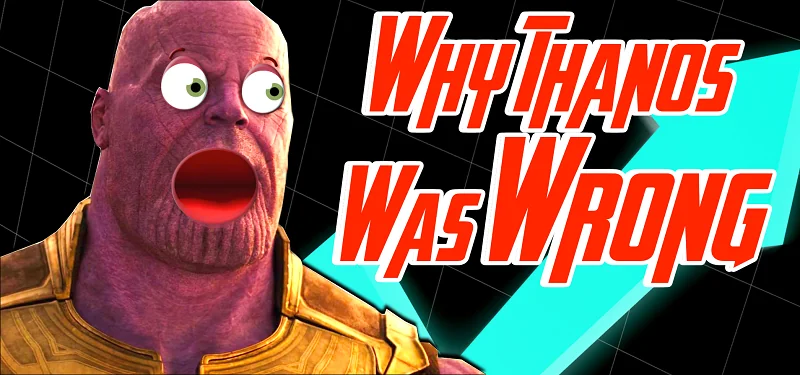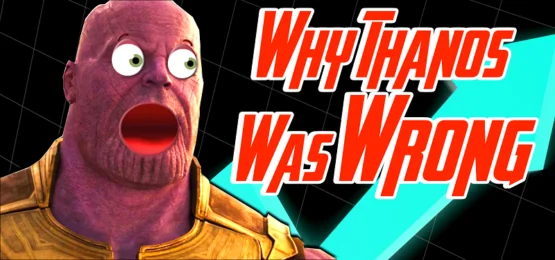Now that some time has passed since the release of Avengers: Infinity War, we should probably talk about Thanos, the nigh-omnipotent “Mad Titan” at the heart of Marvel’s latest blockbuster, and how he perfectly embodies one of the most pervasive societal misconceptions circling the topic of life extension. This might, therefore, be the first post here on LEAF that necessitates a spoiler warning, so here it is!
SPOILER ALERT — IF YOU CARE ABOUT HAVING INFINITY WAR, WHICH IS AN EXCELLENT MOVIE THAT YOU SHOULD SEE, SPOILED, PLEASE ABANDON SHIP AND HEREUPON RETURN AFTER WATCHING
Why Thanos Is Wrong
In Infinity War, the character of Thanos, his name itself an analog for the Greek death god Thanatos, is singularly focused on destroying half of all life in the universe as a means to “balance the scales”. Fairly textbook villain stuff, perhaps, but where it gets interesting and relevant is his reasoning behind this goal.
After witnessing the downfall of his home planet, Thanos reckoned that this culling is a necessary panacea to the anticipated side effects of overpopulation, such as scarcity of resources and environmental destruction.
Watching this play out, it is impossible not to think of the 18th-century cleric and demographer Thomas Malthus, whose influential 1798 treatise An Essay on the Principle of Population sounded dire warnings against the ills of a growing population – famine, war, disease, and poverty – as food production fails to keep pace.

While Malthus did not advocate genocide as a solution to this problem, opting instead for preaching abstinence and delayed marriages, his theories went on to inspire many draconian population control tactics throughout history, such as the Poor Law Amendment Act of 1834, denial of food aid during the Irish Potato Famine, and justification for the darker aspects of eugenics.
These ideas have also left a powerful mark on pop culture long before Thanos stepped onto the silver screen: Ebenezer Scrooge in A Christmas Carol initially stating that the poor should die quickly to decrease surplus population, contraceptive-dispensing “Malthusian Belts” in Aldous Huxley’s Brave New World, the villain from Dan Brown’s Inferno seeking to release a plague on the world to keep population at bay, etc.
Of particular note in recent history is the 1968 best-seller The Population Bomb by Paul and Anne Erlich, which predicted impending Malthusian doom for the entire planet and had a powerful impact on public discourse. To quote from the early editions: “The battle to feed all of humanity is over…at this late date, nothing can prevent a substantial increase in the world death rate.” As one specific case, for example, they stated that it would be impossible for the country of India to ever reach food sustainability, and they expressed support for government-mandated sterilization of all Indian males with three or more children as a solution to the problem.
So, what happened?
It turns out that at the very same time the Ehrlich’s were preaching calamity, the Indian food production problem was already being solved. This was thanks largely to the work of Norman Borlaug, who used genetic crossbreeding techniques to create variations of wheat that were vastly more productive. This was the birth of the “Green Revolution”, and it is innovations like this that doomsayers like Malthus and the Ehrlich’s failed to predict. As this chart shows, the decline of poverty has been rapid thanks to technological and scientific progress.

When it comes to sustainability, the issue is far more complex than only the number of people on the planet: it is the efficiency of the tools that people use to generate resources from the land, how these resources are allocated, and the capacity for human ingenuity to anticipate and solve problems, as Norman Borlaug did. This is, fundamentally, what Thanos got wrong.
 That being said, issues like inequity of resources, species extinction, and ecological destruction are legitimate concerns to be discussed and addressed, but their root lies chiefly in matters of policy, not population. A particularly salient example of this is the current situation in Venezuela, where its command and control economic structure has left the majority of the population susceptible to extreme resource shortage and poverty. This is actually an issue that is addressed directly in another recent Marvel blockbuster, Black Panther, with how certain characters critique the policies of Wakanda regarding the sequestration of wealth and resources. To quote William Gibson: “The future is already here — it’s just not evenly distributed”.
That being said, issues like inequity of resources, species extinction, and ecological destruction are legitimate concerns to be discussed and addressed, but their root lies chiefly in matters of policy, not population. A particularly salient example of this is the current situation in Venezuela, where its command and control economic structure has left the majority of the population susceptible to extreme resource shortage and poverty. This is actually an issue that is addressed directly in another recent Marvel blockbuster, Black Panther, with how certain characters critique the policies of Wakanda regarding the sequestration of wealth and resources. To quote William Gibson: “The future is already here — it’s just not evenly distributed”.
History is rich with examples of how improper management of resources and growing economic inequality leads to societal collapse; it is therefore on all of us to work towards policies and goals that overcome these eventualities. Call me optimistic, but I believe that we can do far better than Thanos in coming up with solutions to such challenges.
Why Thanos Is Stupid
In addition to Thanos being incorrect in his assumptions, it is also worth pointing out how his chosen solution is straight-up stupid — even if his overpopulation-as-the-root-of-all-evil assessment was true. Forbes and others have already run pieces explaining a few reasons why, but here’s a few more and some expounding on those already mentioned:
-
- If the goal is to create a paradise where everyone’s basic needs are sustainably met, Thanos could simply use the Infinity Gauntlet to directly make this a reality rather than perhaps achieving this indirectly via population control. Indeed, one would think that randomly murdering half the population of every inhabited planet would yield highly unpredictable results. Thanos seems familiar with Earthling media, judging from his knowledge of Tony Stark, but apparently, he’s never watched the Leftovers.
-
- Even if the only answer was to limit population growth, why not *snap* to sterilize a certain percentage of the population, or, better yet, make easy and effective contraceptives available to everyone and see how it goes for a bit.
-
- Thanos acts as if once he accomplishes the “halvening”, his work will be forever done and he can enjoy the peace of a grateful universe. Due to the fact that birth rates historically have a far greater effect on population growth than death rates, however, Thanos would likely have to repeat his work every generation to keep total population stable over time. While it could, to be fair, turn out that Thanos timed his snap perfectly in terms of making Earth’s population sustainable over the long term, this timing is in no way guaranteed for every planet in the universe.
-
 Even if the power of the Infinity Gauntlet is somehow unable to solve the problem of limited resources directly, Thanos could surely use it to create a Dyson Sphere around Earth’s sun and the stars of other inhabited solar systems — supplying effectively infinite energy for everyone in the universe. You might suggest that maybe he did not think of this, but the great forge Nidavellir, where Thor and Peter Dinklage fashion Stormbreaker, is essentially a limited Dyson Sphere, and we know Thanos has been there.
Even if the power of the Infinity Gauntlet is somehow unable to solve the problem of limited resources directly, Thanos could surely use it to create a Dyson Sphere around Earth’s sun and the stars of other inhabited solar systems — supplying effectively infinite energy for everyone in the universe. You might suggest that maybe he did not think of this, but the great forge Nidavellir, where Thor and Peter Dinklage fashion Stormbreaker, is essentially a limited Dyson Sphere, and we know Thanos has been there.
Why Thanos Could Use Some Coffee And Conversation
Despite his moniker as the “Mad Titan”, the version of Thanos we see in Infinity War is actually quite sane, measured, and even empathetic (in his own way). This leads me to believe that he, just as others who may think like him in the real world, can be reasoned with. For Thanos, the chain of his logic is understandable, given the starting point of his assumptions; however, it is in these assumptions themselves where he has gone wrong.
 Perhaps if he were to be engaged on this directly, with earnest conversation rather than violent confrontation, he could come to see things differently.
Perhaps if he were to be engaged on this directly, with earnest conversation rather than violent confrontation, he could come to see things differently.
It is easy to fall in love with the trappings of heroism: Cap’s shield, Iron Man’s lasers, drawing a sword to slay a dragon. Sometimes, this is necessary, but, sometimes, being a hero means seeking to understand the real problem that both you and your “enemy” are trying to solve and finding a way forward together.
Who knows; this could indeed be how the universe is restored in Avengers: Infinity War Part 2. In the meantime, if you see him, please point Thanos my way; I’d love to share some coffee and talk over some graphs.
And if you enjoyed this discussion about why Thanos was wrong, there is also a video on the topic over at Youtube Channel WorldofGeekdom.





